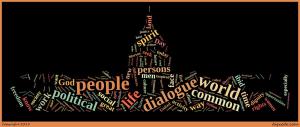
Abusing foreigners, denying healthcare to the poor, engaging racism, and even destroying the environment thanks to the health hazards which ensue, all flow from or promote the denial of the dignity of the human person, that is, each represents a denial of the value of human life. Ignoring the conditions for life to flourish, or worse, promoting injustices which not only hinder human survival, but human dignity, are both sins which must be confronted even as the structures of sin which develop from them must be deconstructed and removed.
Human life has value. Acting against that value tarnishes the soul. Sin, and the structures it creates, tends to suggest we can pit social justice and the common good against the “salvation of souls.” By doing so, sin tries to hide the way engaging such injustices corrupts the soul. The salvation of souls must include justice, and that means, social justice. Those who would deny the value and expectations of social justice, indeed, those who would work against it, corrupt themselves and will have to come face to face with that corruption and cast it off from themselves if they want to be saved.
To support the value of life, we must seek for and do what we can to establish justice in the world. To willfully ignore or support injustices is to deny the value of life. While there can be, and are, complementary reasons for this, for the Christian, the primary reason has been revealed to them as the law of love, the law which says they are to love God and our neighbor as themselves. “The one guardian of life is love, but to be loved you must love.”[1] Any disregard for our neighbor and their ultimate good is a violation of the law of love. It is a sin. And like all sin, will lead to the corruption of our being, a corruption which, if left unopposed, would lead us to follow the rationale promoted by sin, that is, the parasitic destruction of being which ultimately leads to its elimination (that is, death):
Our response with regard to sin is that we should not harm our neighbor. Scripture says “You shall not commit adultery. You shall not kill” and so forth [Ex 20.13-14]. Here the Law is general and the final word on such these matters. It further says that we should love our neighbor as ourselves [Lev 19.18; Mt 22.39], precepts which are carried out each day as well as violated. No one who judges something as evil today, whether murder or anything else forbidden, should regard it as good the following day. Since an evil of this kind always transpires in time, indeed no harmful action would be becoming with respect to time. [2]
Jesus showed us the way of love. He did not render evil for evil, but rather, he shared his love, mercy, and grace to all so that the good which he saw in all could be freed from the bondage of sin and attain its proper potential. Christians, members of his mystical body, are to go and do likewise:
We encourage you to “abstain” in love, “from every wicked deed” and to pursue chastity and justice. Children of light ought “to cast off the works of darkness.” So turn aside hatred, deflect lies, dispel pride with humility, wipe out avarice through generosity. It becomes the members [of a body] to be compatible with their head, so that we may deserve to share in the blessedness he has promised, through the Lord. [3]
Sadly, so many Christians have turned away from God and the way of love. They give all kinds of excuses to justify the unjustifiable. They tend to follow Cain in saying they are not to be their “brother’s keeper,” indeed, they say they are not meant to be. They say they are not to be too concerned with what happens in the world because Christians should only be concerned about the salvation of souls. Such a response does not follow Christianity, but rather, the false perspective of the so-called Gnostics, for it would have us ignore or reject the good of material creation, suggesting it has no place in in the eschaton. Christian ethics must be holistic, understanding that what is done either in their material or the spiritual realm existence has an effect on the other. The human person is both material and spiritual and the two are integrated as one. Christians who try to use their faith to deny justice converts Christianity to an ideology which undermines the true teaching of Christ:
Without the transfiguration of the material world into a fact of relationship and the starting-point for a relationship, the Christian ethic no longer looks towards the existential “changing” of man, the salvation of life from corruption and death. It turns into an idealistic system which, like all idealism, is inevitably conventional and essentially irrelevant to real life and its problems. [4]
Christian history shows how Christians have failed to promote and live out the social justice found in their Scripture and tradition. What Christians have ignored others have embraced. Many non-Christians are doing what Christians should be doing, putting Christians to shame, as they explore and promote the implications of social justice. Since they have done which Christians have not done, Christians can and should listen to them, finding out what they have ignored, so that they can then work with non-Christians in the promotion of the common good. In this fashion, Christians can even learn from non-Christians what is necessary for the dignity of life to be authentically promoted. They can learn from others, even those who do not call themselves pro-life, what it means to support the dignity of life. This is why St. John Paul II was encouraged by the way the world was coming together to deal with the environment, as he saw in it a sign of humanity coming to recognize the value of life:
Another welcome sign is the growing attention being paid to the quality of life and to ecology, especially in more developed societies, where people’s expectations are no longer concentrated so much on problems of survival as on the search for an overall improvement of living conditions. Especially significant is the reawakening of an ethical reflection on issues affecting life. The emergence and ever more widespread development of bioethics is promoting more reflection and dialogue-between believers and non-believers, as well as between followers of different religions- on ethical problems, including fundamental issues pertaining to human life. [5]
Those who would suggest human superiority or dominion over world means humanity can and should use the goods of the earth as they wish without concern, that is, selfishly, undermine what such superiority is meant to entail. The more one is given, the more responsibility they hold. Being given stewardship over the earth means humans have the greatest responsibility to it. They are meant to render loving service to it, helping to protect it from those who would cause it harm:
As one called to till and look after the garden of the world (cf. Gen 2:15), man has a specific responsibility towards the environment in which he lives, towards the creation which God has put at the service of his personal dignity, of his life, not only for the present but also for future generations. It is the ecological question-ranging from the preservation of the natural habitats of the different species of animals and of other forms of life to “human ecology” properly speaking – which finds in the Bible clear and strong ethical direction, leading to a solution which respects the great good of life, of every life. In fact, “the dominion granted to man by the Creator is not an absolute power, nor can one speak of a freedom to ‘use and misuse’, or to dispose of things as one pleases. The limitation imposed from the beginning by the Creator himself and expressed symbolically by the prohibition not to ‘eat of the fruit of the tree’ (cf. Gen 2:16-17) shows clearly enough that, when it comes to the natural world, we are subject not only to biological laws but also to moral ones, which cannot be violated with impunity”.[6]
Ignoring the environment, ignoring our stewardship over the earth, can lead to drastic consequences, such as climate change. Sin creates its own consequences, consequences which can be understood as a kind of punishment. Communal sin which ignores the good of the earth and all that is on it, indeed, communal sin which seeks to exploit the earth instead of serve as its stewards, creates hazardous conditions for life on earth, conditions which demonstrate the destructive nature of communal sin. Those who think we can ignore, or not be concerned, with the environment, and what we are doing to it, ultimately show they do not value the dignity of life, because they are not concerned about the mass destruction which the destruction of the environment will produce.
The true value of life is found in and promoted by the common good. Injustices not only deny the common good, but destroy it, trying to divide up the common good into parts or private goods which people fight to attain. To justify those who have over those who have not, some systemic explanation develops which suggests that some lives are worth more than others, which then reinforces the mistreatment of those who are deemed worthless:
Because the evil and absurdity of earthly life are due to the fact that every being asserts itself against everything else it does not follow that life’s true meaning is to be found in the affirmation of “the all” against the particular, in the sacrifice of the individual to the race: that is simply the reverse of the same evil, universal discord under another aspect; that each should be destroyed by the whole is no better than that each should try to destroy the others. [7]
It is impossible to be pro-life, to truly value life and its dignity, and be indifferent to or support social injustice. Social injustice lies behind the devaluation of life and it justifies the mistreatment of those who are in need, indeed, justifies the abuse of the oppressed. St. John Paul II was right in saying:
Today this proclamation is especially pressing because of the extraordinary increase and gravity of threats to the life of individuals and peoples, especially where life is weak and defenceless. In addition to the ancient scourges of poverty, hunger, endemic diseases, violence and war, new threats are emerging on an alarmingly vast scale.[8]
How many Christians, especially those who claim to be pro-life, understand this? Their actions say they do not. They might proclaim themselves pro-life, but their deeds tell us otherwise. Is it any wonder that others, upon seeing this, want nothing to do with them? The term “pro-life” has become a political label used by those who do not seek social justice and the dignity of the human person, but rather, by those who seek to promote the value of some humans over and above all others. It is important to truly be pro-life, to serve and defend life, but to do so requires the promotion of social justice, to be practical instead of ideological. If we do not engage social justice, we will find we are the ones who are guilty of indifference to life, and with it, the development and promotion of a “culture of death,” which is not other than the structure of sin which develops upon the denial of such justice.
[1] Marsilio Ficino, The Letters of Marsilio Ficino. Volume 2 {Liber III]. trans. by members of the Language Department of the School of Economic Science, London (London: Shepheard-Walwyn, 1978), 62 [Letter 50 to a man seeking power].
[2] St. Gregory of Nyssa, Homilies on Ecclesiastes. Trans. Richard McCambly. Ed. John Litteral (Ashland, KY: Litteral’s Christian Library Publications, 2014), 62 [Homily 7].
[3] St Leo the Great, Sermons. Trans. Jane Patricia Freeland CSJB and Agnes Josephine Conway SSJ (Washington, DC: CUA Press, 1996), 138 [Sermon 32].
[4] Christos Yannaras, The Freedom of Morality. Trans. Elizabeth Briere (Crestwood, NY: St. Vladimir’s Seminary Press, 1984), 87.
[5] Pope St. John Paul II, Evangelium Vitae. Vatican translation. ¶19.
[6] Pope St. John Paul II, Evangelium Vitae,¶42.
[7] Vladimir Solovyey, God, Man & The Church. The Spiritual Foundations Of Life. Trans. Donald Attwater (Cambridge: James Clarke & Co., 2016), 58-9.
[8] Pope St. John Paul II, Evangelium Vitae, Vatican translation. ¶3.
Stay in touch! Like A Little Bit of Nothing on Facebook.
If you liked what you read, please consider sharing it with your friends and family!
N.B.: While I read comments to moderate them, I rarely respond to them. If I don’t respond to your comment directly, don’t assume I am unthankful for it. I appreciate it. But I want readers to feel free to ask questions, and hopefully, dialogue with each other. I have shared what I wanted to say, though some responses will get a brief reply by me, or, if I find it interesting and something I can engage fully, as the foundation for another post. I have had many posts inspired or improved upon thanks to my readers.












